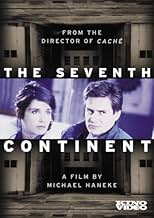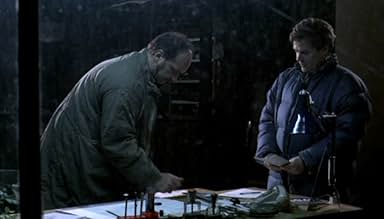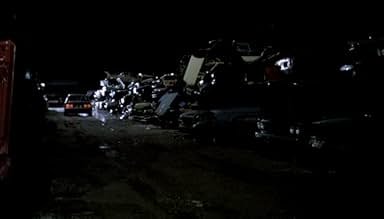Una famiglia europea che ha intenzione di scappare in Australia, sembra intrappolata nella sua routine quotidiana, turbata solo da piccoli incidenti. Tuttavia, dietro la loro calma stanno ef... Leggi tuttoUna famiglia europea che ha intenzione di scappare in Australia, sembra intrappolata nella sua routine quotidiana, turbata solo da piccoli incidenti. Tuttavia, dietro la loro calma stanno effettivamente progettando qualcosa di sinistro.Una famiglia europea che ha intenzione di scappare in Australia, sembra intrappolata nella sua routine quotidiana, turbata solo da piccoli incidenti. Tuttavia, dietro la loro calma stanno effettivamente progettando qualcosa di sinistro.
- Premi
- 2 vittorie e 1 candidatura in totale
- Self
- (filmato d'archivio)
- (non citato nei titoli originali)
Recensioni in evidenza
This was Haneke's first theatrical film & apparently based on a true story--although I'm always skeptical of such disclaimers (the same was said about "Picnic at Hanging Rock," another great creepy film). It's divided into 3 parts: 1987, 1988, and 1989. Many scenes repeat themselves, and we get a clear sense that the family (dad, mom, daughter) is going through the motions of modern life. The banalities have a bizarre and uneasy edge to them, though, that really piles up by the time Part 3 arrives. All I have to say about the last 40 minutes is: OH MY GOD! I thought Gaspar Noe's "I Can't Sleep" (?) had an excruciating buildup, but that one (with all its explicitness) can't hold a candle to the amount of emotional and physical devastation packed into the conclusion of "Continent."
Fans of Haneke's later work should definitely check this one out to see the origin of his trademarks: no music score, seemingly pointless scenes that linger (often with little or no dialogue), off-putting camera angles (we sometimes see only the actors' hands or feet). While these techniques aren't always successful in his films ("Code" had some interminable moments), they all come together seamlessly in "Continent." A superb work!
The long takes Haneke favors throughout The Seventh Continent, introduce the audience to a young family living in Europe that live in precisely the way that is expected of them. Georg Schober (Dieter Berner) works diligently at his career, always placing himself in the best possible position to advance through promotions and better situate himself in his profession. Anna Schober (Birgit Doll), an optometrist, steadfastly maintains her family's home, dutifully completing all the tasks and errands to keep the everyday lives of her family running. Anna is also reacting to the death of a parent, which has devastated her brother, assuming the role of the strong focused sibling taxed with the burden of maintaining her parents' business. The youngest member of the family, Evi, fills her time coloring pictures, doing her homework, and occasionally causing mischief at school by feigning blindness. Neither Georg's career advancements, Anna's mourning, nor Evi's misbehavior is consequential to the story--they are simply moments that happen in each of their lives and fills their days. This is precisely Haneke's point; most of what we do in our lives are mundane activities which fill our time until we die. Whether it be a scene filmed in real time at a car wash or listening to someone relay a story during an eye exam, Haneke gives us these moments in as similar a way as they actually occur, removing all sense of grandiose filmmaking, forcing the audience to see themselves in the lives of those depicted on screen. It's hypnotizing they way we can scoff at collective suicide, yet through watching the events that lead up to the act come to understand the universality of the expectations we adhere to. Every move is repetitive, the same food is served every day at breakfast, the same pommel horse is jumped over in gym class, the same filling station is visited when the car is low on fuel. We often live our lives thinking of the future, fooling ourselves into believing that the monotony we serve daily is crucial to our growth until we are shocked to learn that the future we have been striving towards has become the past. We get so lost in the day-to-day that we need Haneke to make clear that the way we actually live our lives doesn't make all that much sense once analyzed.
The cold emotionless state maintained in the Schober home is sobering to watch. No amount of intimacy brings the family closer together. Even after making love, Georg and Anna immediately return to the distance between each other that fills their days. Not only does one hardly see any affection between the members of the Schober family, but we also rarely see them enjoy conversations with each other. The cold, detached atmosphere isn't confined to their home, either. Each time they exchange currency for a service, the audience is afforded a glimpse into the lives of everyone they interact with, each doing their job or performing a service while all vitality seems to have been drained from their being. Through the entire runtime of The Seventh Continent, we don't see a single meaningful human connection. There is even a scene in which a man recently released from his employment with Georg, returns for his things and isn't given a single embrace of encouragement or a kind word. His appearance disrupts the work because he is unexpected, further cementing Haneke's notion that our lives are simply made up of a series of repeated actions, and we are stricken by the break from routine when interrupted. Despite the lack of compassionate connectivity, I would argue that Haneke's feature is one of the most humanistic films I have recently seen, because it gives hope to our existence and alerts us to think critically about our society.
It is amazing how a masterpiece needs no soundtrack, fancy camera work or explicit and extended dialogs.
Unfortunately, it is very hard to find. The screenings are rare and no personal editions on VHS or DVD exist as far as I am aware. Many will recognize the "Piano Teacher" approach to directing but, this is as powerful as it can get. One of the finest examples of style not overlapping form.
Treat yourself with this lesson. Watch it if you can. Specially if you experienced depression at a given time in your life.
This is not a pleasant movie to watch. It's sad, bleak, disturbing and angry; and Haneke doesn't make it easier to the viewers. He presents life as it is, without any dramatization; and what it strikes me the most is the pace in which he presents it. The characters doesn't shout (they speak every once in a while), fight or cry their hearts out; they just keep on doing the same things they do every day. However, as you watch closer, you sense that something is completely wrong.
To me this is as an existential film as you can get. The world is there: raw, unsympathetic and indifferent. Everything happens without a reason, without hope; and the character's lack of desire to confront the nothingness of an empty life is the central theme of this movie.
"What happens when people are dead from the inside?" That's what I asked myself after watching this cold, cynical, gem of a movie. Can be someone dead from the inside and alive from the outside?. If so, could that person communicate with any other person? How can we avoid the meaningless things in life? Should we fight them back or surrender to them? Watch this movie and then you may find the answers to those questions..... or may be not. HIGHLY RECOMMENDED!. Avoid watching it if you're a bit depressed. This movie is bleak and challenging as hell.
Lo sapevi?
- QuizBased on real events.
- Citazioni
Georg Schober: We have to cancel the newspaper subscription
Anna Schober: Mhm
- ConnessioniFeatured in Selección TCM: Michael Haneke (2012)
- Colonne sonoreSend Me Roses
(uncredited)
Written by Günter Mokesch and Karin Raab
Performed by Günter Mokesch and Karin Raab
I più visti
- How long is The Seventh Continent?Powered by Alexa
Dettagli
Botteghino
- Lordo in tutto il mondo
- 428 USD


























